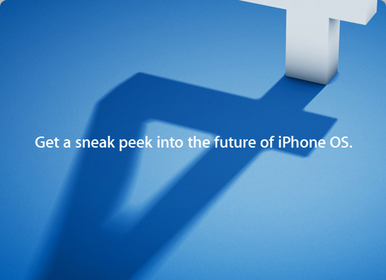Now Apple is behaving like mid-90s Microsoft

There's lots to like in the forthcoming iPhone OS 4.0. Keyboard support. Folders. Pseudo-multitasking that's good enough for most of us. And another 96 new features for users.
But while it's amusing to watch Steve Jobs trying to pretend that the ability to change your home screen wallpaper is in the slightest bit innovative or exciting, yesterday's iPhone announcements were a bit worrying, too.
Steve Jobs is clearly out to get two firms: Google and Adobe. The software development kit for iPhone 4.0 effectively bans iPhone developers from using Adobe's CS5 to port their apps to the iPhone - a move that makes perfect sense for Apple, but which we're sure has ruined lots of developers' days - and the new iAd advertising platform is clearly designed to give Google a kick, too.
It's all very amusing, isn't it?
Isn't it?
Apple's iPhone OS dominates the smartphone market, and it's on 80-plus-million devices. Apple makes each one of those devices. It makes the operating system for those devices. Unless you jailbreak them, Apple's software shop is the only place you can get applications for those devices.
Apple gets a cut of each sale and dictates what apps can and cannot be sold. Apple will soon run the most important advertising network for those devices, taking a cut of each ad and dictating what ads can and cannot appear. And Apple is now telling developers what tools they can and cannot use to create iPhone apps.
Sign up for breaking news, reviews, opinion, top tech deals, and more.
Does anybody else think that's a bit, well, anti-competitive? A bit monopolistic? A bit mid-90s Microsoft?
Let's get something straight here. Apple is no underdog, no plucky Little Firm That Could. It's one of the biggest companies - not tech companies; companies full stop - on the planet.
In terms of market capitalisation, it's bigger than Wal-Mart. It's bigger than GE. It's catching up on Microsoft.
It's the third biggest company traded on US exchanges. And it's starting to throw its corporate weight around to keep its platform as locked down as possible.
If Adobe's CS5 makes it easy for developers to write the same app for multiple platforms, those apps won't be iPhone-exclusive - and as the full-page ads on every second newspaper show, the iPhone platform is all about the apps. If Google gets a foothold in the in-app advertising market, that's money going to Google instead of Apple.
This is not about Apple protecting users from crappy experiences. The App Store is full of crappy experiences that Apple is quite happy to let you buy. This is about protecting Apple from crappy cashflow.
------------------------------------------------------------------------------------------------------

Contributor
Writer, broadcaster, musician and kitchen gadget obsessive Carrie Marshall has been writing about tech since 1998, contributing sage advice and odd opinions to all kinds of magazines and websites as well as writing more than twenty books. Her latest, a love letter to music titled Small Town Joy, is on sale now. She is the singer in spectacularly obscure Glaswegian rock band Unquiet Mind.